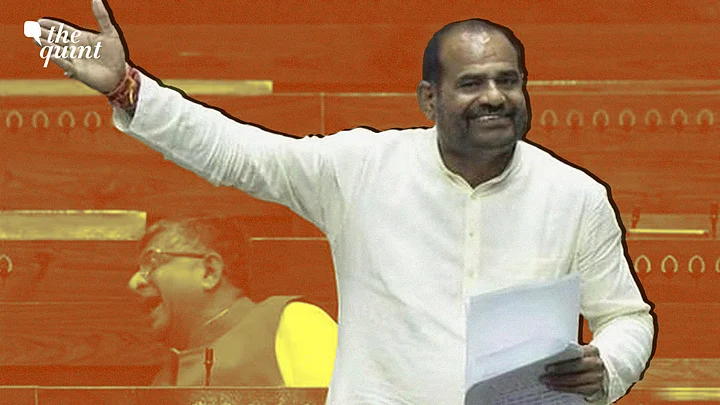In a year when Prime Minister Narendra Modi had picked on the Opposition's use of “bad language,” his own party’s Ramesh Bidhuri has been rewarded with a key poll responsibility after shouting anti-Muslim remarks in the special Parliament session held earlier in September. This begs the question: Why has no action been taken against the BJP MP yet? Moreover, what action can be taken?
Bidhuri in Lok Sabha, had called BSP MP Danish Ali derogatory words on 21 September. Following the controversy, the BJP had issued a show cause notice to Bidhuri over his remarks.
However, on 27 September, Bidhuri was appointed as the party's election in-charge of the Tonk constituency in Rajasthan.
Reacting to this, Ali said, "This has exposed BJP's face and character. If they think that they can consolidate majority vote by promoting such people, then they are mistaken," PTI reported.
On 28 September, Speaker Om Birla referred MPs complaints on the use of objectionable words against BSP MP to the Privileges Committee.
First, let’s take a look at the grounds on which Opposition leaders have been suspended/disqualified this year.
Opposition Leaders Suspended For Much Less?
This year, the Opposition has regularly targeted government over suspension of its MPs for protests over various issues – such as Manipur, Delhi services legislation and price rise and even on the reported stifling of their voices in Parliament.
Actions were taken against the following political leaders for different reasons:
Rahul Gandhi: A day after he was convicted in a defamation case by a Surat court for his alleged remarks on the ‘Modi’ surname, the Congress leader was disqualified from the Lok Sabha on 24 March.
Sanjay Singh: The Aam Aadmi Party MP was suspended on 24 July from Rajya Sabha due to ‘repeatedly violating the directions of the chair.’ He was reprimanded for repeatedly protesting against the Centre's ordinance on control of bureaucrats in Delhi.
Sushil Kumar Rinku: On 3 August, this AAP Leader was suspended from Lok Sabha for throwing papers at the chair. Parliamentary Affairs Minister Pralhad Joshi moved the motion for Rinku’s suspension.
Derek O'Brien: The TMC Rajya Sabha MP was suspended on 8 August during the last monsoon session of the Parliament over his "unruly behaviour, unbecoming of a member of the Rajya Sabha." He had urged for a discussion on Manipur's situation.
Adhir Ranjan Chowdhury: The Congress leader was suspended from Lok Sabha on 10 August for "repeated misconduct" pending an investigation by the Privileges committee. He was suspended after he referred to the Mahabharata, saying that the 'King should not be blind' to what is happening against women whether it is in Hastinapur or Manipur.
Raghav Chadha: The AAP MP was suspended on 11 August from the Rajya Sabha over alleged fraud — including names without consent in a motion in the House. Chadha raised questions over the Delhi Services Bill.
But What Do the Rules Say?
Remember last year's booklet? In July, Lok Sabha Secretariat issued a booklet claiming the use of certain words as "unparliamentary."
It placed a gag order on certain words such as "jumlajeevi," "Baal buddhi," "Covid spreader and "Snoopgate" and even common words like "abused," "betrayed," "corrupt," "fake," among others.
But shouldn't words like "Katwa," and "Bhadwa" shouted openly in the House, be unparliamentary enough to invite immediate punitive action?
It's worth noting that according to Article 105 (2) of the Constitution: "No member of Parliament shall be liable to any proceedings in any court in respect of anything said or any vote given by him in Parliament or any committee thereof" — This is to say that the MP cannot be prosecuted for anything said in the House.
In fact, there is an Ethics Committee, the ethics panel of which is yet to lay down a code of conduct for MPs in the Lok Sabha.
Then there is the Rules of Procedure and Conduct of Business in Lok Sabha. Some of which are as follows:
Rule 373: The Speaker can direct a member to withdraw immediately from the House if he finds the member's conduct disorderly. Members so ordered to withdraw shall do so forthwith and shall remain absent during the remainder of the day’s sitting.
Rule 374: The Speaker can name a member who disregards the authority of the Chair or abuses the rules of the House by persistently and willfully obstructing the business thereof.
In fact, Rule 374 (A) explicitly states that on account of 'shouting slogans' and 'obstructing the business' of the House, on being named by the Speaker, the MP stands "automatically" suspended.
Moreover, section 8 in The Representation of the People Act, 1951 states that a disqualification can happen if the person is convicted of an offence punishable under section 153A (offence of promoting enmity between different groups on ground of religion, race, place of birth, language, etc).
Furthermore, according to Section 8 (3) of the Act, if an MP, MLA or MLC is convicted of any offence and is sentenced for at least two years, he attracts disqualification and “shall be disqualified from the date of such conviction and shall continue to be disqualified for a further period of six years since his release”.
If the Speaker, as per Rule 380, is of opinion that words have been used in debate which are "defamatory or indecent or unparliamentary or undignified," the Speaker may expunge them from the proceedings of the House. But this has not happened yet.
As more time goes with Bidhuri going unpunished, it shows the normalisation of anti-Muslim sloganeering, even in Parliament.
(At The Quint, we question everything. Play an active role in shaping our journalism by becoming a member today.)
